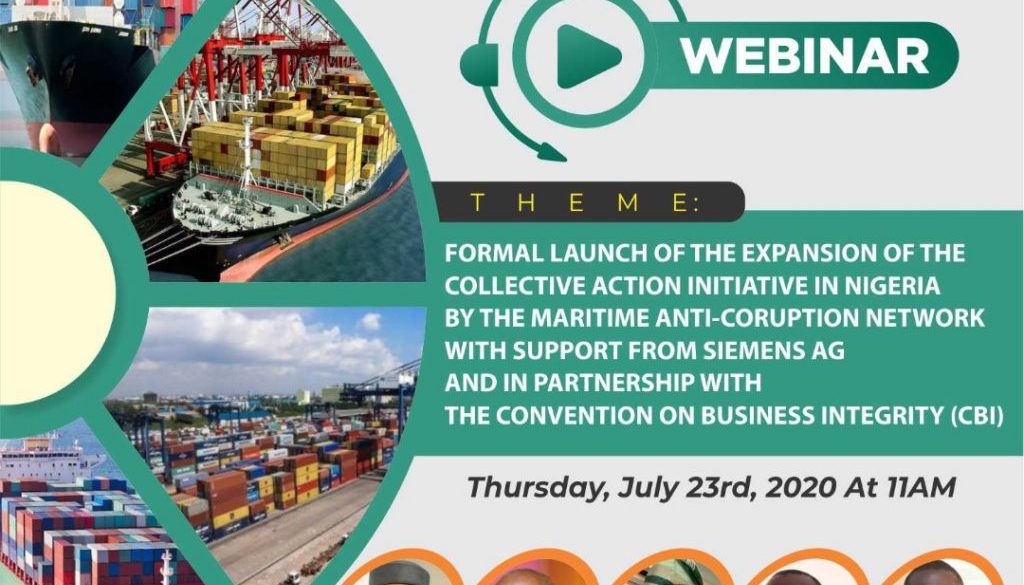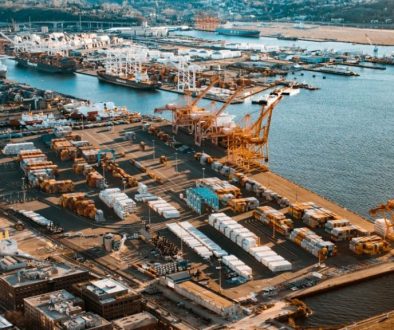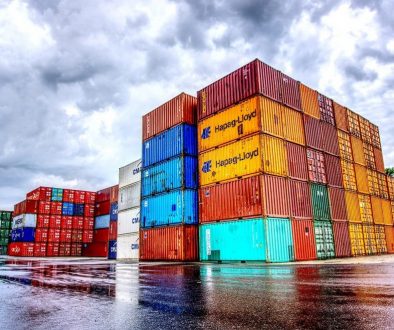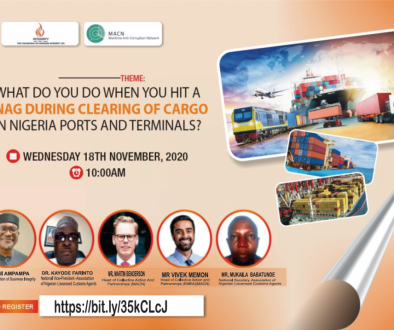Communique & Highlights from the MACN CBI Webinar on ”Corruption in the Cargo Clearance Process at the Nigerian Ports”

The program was organized to formally launch the MACN Siemens initiative that will be implemented over the next three years, 2020- 2023. During this period, MACN and CBi will enable port users to track, demand, and drive greater compliance in Nigerian ports, the initiative will also help strengthen government capability to establish compliance systems and collaboration between business, government, and civil society. This will create the platform for the cultural changes that are necessary to improve trade flows in and out of Nigeria and support the social economic growth the Nigerian government is targeting.
The Maritime Anti-Corruption Network (MACN)—a global business network of over 130 companies working together to tackle corruption in the maritime industry—is expanding its Collective Action initiative in Nigeria with the support of the Siemens Integrity Initiative.
OBJECTIVE
The goal of the project is to establish more effective seaports and terminals services in Nigeria and adopt corruption prevention practices via improved compliance with Standard Operating Procedures (SOPs).
ISSUES RAISED & PROPOSED RECOMMENDATION DURING THE WEBINAR
Issue 1: Corruption in the Maritime industry precedes decades and the situation has gotten worse in the last decade. The “germinators” and enablers of Corruption in the Maritime Industry cut across all the different stakeholders in the Maritime Industry (The Shipper/Shipping Agencies, The Terminal Operators, Security Agencies, The Transporters/Haulage Company, Government Agencies, Lack of infrastructural facilities, especially good roads, right technology etc) c. There is disinclination by the Port Agencies to do the right thing, which is further magnified by the attitude of the port users that are benefiting from the corrupt system. These combined forces have therefore made the regulations in place ineffective.
Recommendation: There is need for more collaborations with all relevant stakeholders at the ports to ensuring compliance with SOPs. There is also the need for Stakeholders to take ownership of the operations at the ports and be willing to do the right thing. The Government needs to show the political will to do what is needed to rid the ports off corruption.
Issue 2: Corrupt practices have thrived at the ports over the years because of the lack of a consequence mechanism, which makes many of the Port officials/ users act with impunity. There is also no structured/ viable process for seeking redress when there are issues.
Recommendation: Rules should be clear and consequences for bad behavior should be spelt out and acted on accordingly. There is the need to have a Dispute Resolution Team at the Ports alongside the Grievance Mechanism portal that is already operational.
Issue 3: There is no process/ system for identifying those who are authorized to work in the ports, which gives room for many “agents” who tend to extort port users. In addition to this, there is still a lot of paperwork from individuals to agencies, which breeds corruption.
Recommendation: There is the needto ensure that processes at the port are technologically driven and the documentation processes are automated. There is also the need to put necessary structures in place to ensure that only those that are authorized to be at the ports have access to the ports and liaise with port users. There should be provision of a document that is accessible to all port users that states clearly the duties and responsibilities of all the ports agencies to ensure that port users know whom to deal with directly. Manual Call-up System be adopted pending when the Electrical System is concluded on.
Issue 4: There is no coordination between all the different agencies operating at the ports and there is a lack of checks and balances on the part of port agencies.
Recommendation: There is the need to ensure that regulation is not revenue driven, this will ensure all agencies operate within the confines of their jurisdiction with activities more coordinated and necessary checks, and balance for all port agencies are in place.
Issue 5: All the agencies operating at the ports haveStandard operating procedures (SOPs) but the tenets of the SOPs are not fully adhered to.
Recommendation: There is the need to create more awareness of the existence of the Standard Operating procedures (SOPs) and ensure their full implementation across board.
Issue 6: There is still the perception that there is congestion at the ports despite all the efforts of the Task force saddled with the responsibility of ensuring law and order at the ports. Recommendation: The efforts of the task force in ensuring free vehicular movement of trucks to the ports should bepublicized on all media platforms to change the narratives.
PANELISTS
Panelists at the Webinar were:
- Dr. Kayode Opeifa- Vice Chairman, Presidential Task force on Restoration of Law & Order, Apapa, Lagos
- Prince Olayiwola Shittu- Former President, ANCLA (Association of Nigerian Licensed Customs Agents)
- Mr. Babatunde Ruwase- Former President, LCCI (Lagos Chamber of Commerce and Industry)
- Dr. Muda Yuusf- Director General- LCCI (Lagos Chamber of Commerce and Industry)
- Mr. Soji Apampa- CEO, The Convention on Business Integrity/Integrity organisation
The launch brought together major players and stakeholders in the Maritime sector. Participants joined the webinar from Nigeria and other parts of the world including South Africa, United Kingdom, United States of America, and Canada.
STATISTICS ON ATTENDANCE & PARTICIPATION
Registered participants = 104
Unique viewers = 93
Total users = 225
Maximum concurrent view = 0
NEXT STEPS
- Engage the government agencies with presence at the ports to nominate members of staff to be trained as compliance officers for each port location/operations within Nigeria.
- Continuous engagement with the ports users in the eastern and western ports on the availability of the helpdesk, need to adhere to SOPs and exposure of the draft code of conduct.
- Engage the Civil Society to prepare and publish annually independent assessment of progress of corruption prevention at the ports.



